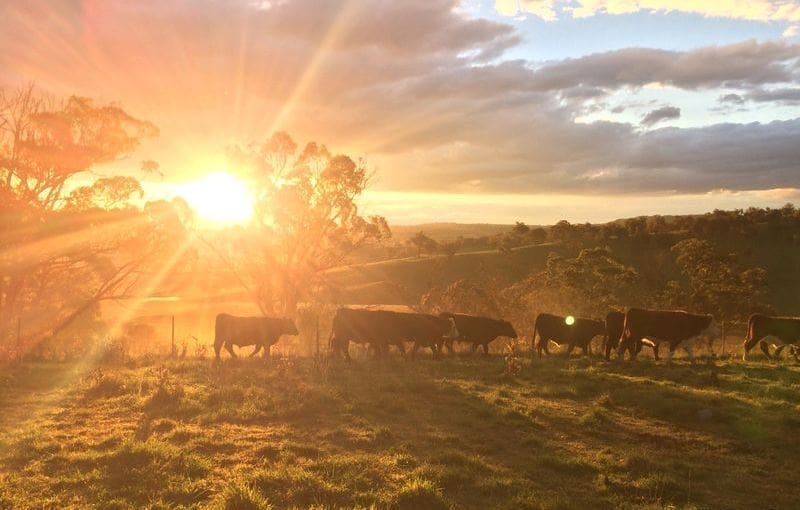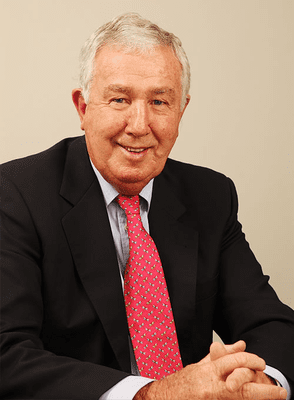
WHILE seemingly nothing and no-one is immune to the impact of COVID-19, Australian agriculture appears to be in good shape, with many property agents cautiously optimistic that rural land assets will continue to be a good investment for both domestic and foreign buyers.
In times of financial uncertainty, agriculture and food production are increasingly seen as safe havens for investors.
Bruce Gunning, the principal of Ray White Rural International has observed that many purchases are being made by investor types shifting their money away from city-based investments, where the effect of COVID-19 can be greater, to land assets involved in food production.

Bruce Gunning
He said the world doesn’t know what effect the Coronavirus will have long term, but it is largely business as usual for Australian agriculture.
“One of my projects has been offered overseas funding, because agriculture is showing to be a really good investment at present,” he said. “No matter how difficult things get, the world still needs to eat and clothe itself. Food and fibre production will continue, no matter what the circumstances in other forms of business.”
Mr Gunning said that if investors had to choose between a shopping centre, a commercial building or large rural operation, the food and fibre industry would often be the safest bet.
“Australian agriculture can generate an income in difficult times. This says a lot about this country. Despite several years of below average rainfall, poor climate conditions and disastrous fires, agriculture just keeps on keeping on,” he said.
FIRB
In the wake of any economic impact brought on by COVID-19, the Federal Government recently announced deeper levels of scrutiny of foreign investments (click here to view original story) that will remain in place for the duration of the current crisis.
It has removed the previous price threshold, which means all proposed foreign investments, regardless of value, are currently subject to Foreign Investment Review Board approval.
In addition, the FIRB has extended its timeframe for reviewing applications from 30 days to up to six months.
Mr Gunning doesn’t believe the recent changes will negatively impact overseas investment in Australian agriculture, however.
“They are just another hurdle for potential buyers to navigate in order to gain approval for a sale. In reality, there hasn’t been much FIRB interference in any overseas purchases acquiring land, with the exception of GrainCorp and S. Kidman and Co.”
In 2013, the FIRB blocked the US global food processing and commodities trading corporation, Archer Daniels Midland’s $3.4 billion takeover of GrainCorp for political reasons.
Then, in 2016, the Federal Government knocked back the proposal for the sale of Australia’s largest cattle empire to a foreign-led consortium explaining it was “contrary to the national interest.”
QLD land tax
Mr Gunning conceded that temporarily lowering the foreign investment thresholds to $0 may stop overseas investors from acquiring smaller holdings.
“It is a possibility, but Queensland has done its very best to stop overseas investment by increasing the land tax on rural landholdings,” he said.
In June, the Queensland state budget introduced a new surcharge for overseas companies and trusts, effectively doubling their land tax liability.
Mr Gunning believes the move is a bigger disincentive to invest in Australia than the FIRB changes.
“Imposing two percent on the value of the investment each year is an enormous amount. If that is what Queensland does to foreign buyers in the rural property space, I don’t know why they would be rushing to invest.”
Mr Gunning reports that buyer inquiry is currently quiet.
“Investors understand that times are uncertain, and they are reluctant to make big changes in the early stages, because they don’t know what the repercussions will be. There are many interested parties, but they are proceeding with caution at this time.”
Chris Meares, Meares and Associates
Sydney-based rural property agency, Meares & Associates remains open for business during the COVID-19 crisis, continuing to service clients both within Australia and offshore.

Chris Meares
Principal Chris Meares said his business depends to a large degree on the strength and confidence in the investment market.
“If it drops significantly or for that matter goes into a state of decline in any shape or form, it will affect markets, and in turn can affect us. Commodity prices, seasonal conditions and the current Coronavirus can all impact investment markets,” he said.
Even before the recent stock market crash, Mr Meares was advising his clients to pull back.
“It is unwise to go to market in this environment. There is too much uncertainty surrounding investment, banking and the economy.”
“COVID-19 is affecting the confidence of all buyers and sellers, banks and governments at present. This negativity is having a domino effect and is putting pressure on all markets and the economy in general,” Mr Meares explained.
He said his company was currently negotiating on a number of property deals in New South Wales – but those negotiations commenced prior to the onset of the pandemic.
“Overall, we strongly believe that hard assets, such as good quality rural property, remain an excellent investment. This has continued to be the case in recent years, even with confidence-sapping droughts and floods prevailing.”
Mr Meares said at no stage had there been a drop in values of 30 to 40 percent, which were witnessed in the recent stock/equities market collapse.
“In fact, grazing land values continued to rise to all-time highs during the recent drought. Assuming the COVOID-19 situation sorts itself out in the next couple of months, there is unlikely to be much change to the pre-virus land values.”
“There are lots of pluses – the fundamentals coming into this downturn were, and remain, very strong, seasonal conditions are correcting themselves, and commodity prices are strong and the exchange rate remain favourable, given that we are a major exporter,” Mr Meares said.
However, if the Coronavirus pandemic does not resolve itself in reasonable time and takes 9-12 months or longer to pass, he believes there will be damage to markets and asset values.
“While the upper end of the market currently remains strong, the bottom end has had a reprieve, because in many of these areas the seasons have turned, and with strong commodity prices they are also holding their values. If the drought had continued, this end of the market would have taken a dive. The same will apply if the pandemic drags on for an extended period.”
As a result, Meares & Associates is advising clients not to go to market at present, and those currently listing not to proactively promote in the current climate.
Trent Thorne, McCullough Robertson Lawyers
Trent Thorne is a Brisbane-based agribusiness lawyer at McCullough Robertson.

Trent Thorne
He said the banking sector was closely examining the impact of the wrecking ball that is currently moving through the economy.
“It is looking at certain sectors and determining whether lending proposals going forward are ‘no go’ or ‘extremely unlikely’ propositions. It wouldn’t surprise me if the commercial property space will experience difficulties for some time,” he said.
Mr Thorne said there is no doubt that agriculture was still viewed very positively.
“Banks are continuing to lend to people who require capital – there isn’t a slow down or any bottlenecks. Agribusiness deals are coming across my desk, which means funds are being approved.”
FIRB
Mr Thorne said the company’s offshore clients had been made aware of recent Foreign Investment Review Board amendments.
“Some of them are either in the process of considering acquisitions or looking at various opportunities. Regardless of the changes, they are likely to adopt a wait and see approach, much like everyone else.”
He said he understood why the new FIRB regulations had been introduced, but doesn’t think they will be in place over the longer term.
“No one knows what impact COVID-19 will have on the economy, in the longer term. It is important not to expose Australian properties to cheap acquisitions by foreign entities. Australia needs to have some strength underlying the sectors before those rules are reconsidered,” Mr Thorne said.
That being said, he believes that agriculture is better placed to weather the storm and will continue to be that way for a number of years.
“There is no doubt Australian agriculture will feel pain like other parts of the economy, but everyone needs food and fibre and that is at the forefront of the average consumer’s mind now.”
Agents Mr Thorne has spoken with claim that some rural land buyers and sellers are taking a deep breath and watching how this plays out.
“Many producers are focussing internally at the present time – dealing with their own significant issues and operations. What was once simple has become more complicated.”
Mr Thorne expects to see some normality in the rural property space once everyone has surveyed the different scenarios playing out.
“I have no doubt people will decide to list, particularly given the rain, but others may sit back and let others test the waters to determine if there is some market confidence and solidity.”
“Rural properties are certainly in a different space to residential and commercial. While there may be some falls, they won’t be anywhere near the magnitude that other areas could experience,” he said.
Snapshot comments on COVID’s likely impact on land values
Chris Holgar – JLL Agribusiness
“In the current market, the spotlight may be put on agriculture, reaffirming its importance in the Australian economy and as an investment class. Eventually, there may be some new capital. Existing stakeholders invested in the space should be able to generate good returns.”
Danny Thomas – CBRE Agribusiness
“The positive side of the equation is that we have that buffer in our economy that others don’t. If Australia continues to have an exchange rate under or around US60c, that should be a call to action for all $US investors to tip more money in here. So, unless there are liquidity issues (availability of foreign funds) Australia should actually be more attractive for people offshore, who want to invest in agriculture.”
Mr Thomas said at the present time, there were good market signals about commodity prices, so there are many reasons why people, notwithstanding the negativity out there, should be positive about agriculture.
Ben Forrest – Resolute Property Group
“There is uncertainty, but if there was ever a time to enjoy hard assets, such as rural properties, it is now. It is difficult to know how the macro economy will affect the bush in the short term. In the long term, it reinforces the viability of the industry. Like a lot of things, many assets are fuelled by debt and cheap money, so it is important to assess whether they are viable. Rural land is still sought-after and is perceived as a safe asset. As long as interest rates are down, people will keep accumulating.”
